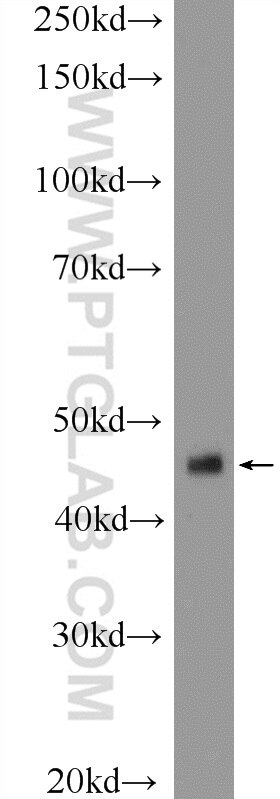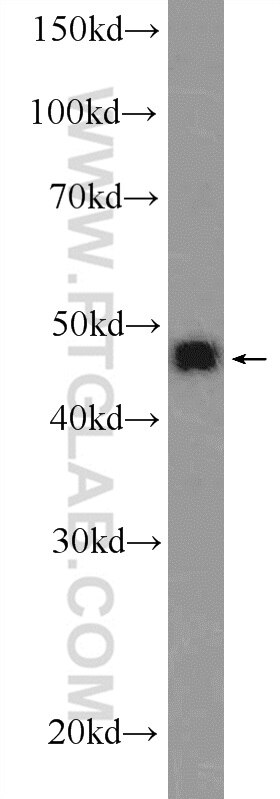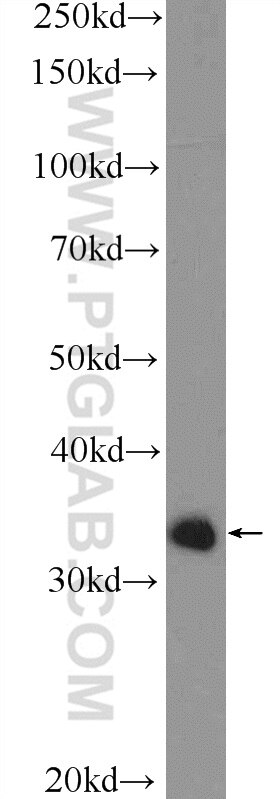Tested Applications
| Positive WB detected in | mouse liver tissue, A375 cells |
Recommended dilution
| Application | Dilution |
|---|---|
| Western Blot (WB) | WB : 1:500-1:1000 |
| It is recommended that this reagent should be titrated in each testing system to obtain optimal results. | |
| Sample-dependent, Check data in validation data gallery. | |
Product Information
17921-1-AP targets ING1 in WB, ELISA applications and shows reactivity with mouse, human samples.
| Tested Reactivity | mouse, human |
| Host / Isotype | Rabbit / IgG |
| Class | Polyclonal |
| Type | Antibody |
| Immunogen |
CatNo: Ag12338 Product name: Recombinant human ING1 protein Source: e coli.-derived, PGEX-4T Tag: GST Domain: 1-279 aa of BC093942 Sequence: MLSPANGEQLHLVNYVEDYLDSIESLPFDLQRNVSLMREIDAKYQEILKELDECYERFSRETDGAQKRRMLHCVQRALIRSQELGDEKIQIVSQMVELVENRTRQVDSHVELFEAQQELGDTAGNSGKAGADRPKGEAAAQADKPNSKRSRRQRNNENRENASSNHDHDDGASGTPKEKKAKTSKKKKRSKAKAEREASPADLPIDPNEPTYCLCNQVSYGEMIGCDNDECPIEWFHFSCVGLNHKPKGKWYCPKCRGENEKTMDKALEKSKKERAYNR Predict reactive species |
| Full Name | inhibitor of growth family, member 1 |
| Calculated Molecular Weight | 279aa,32 kDa; 422aa,47 kDa |
| Observed Molecular Weight | 47 kDa |
| GenBank Accession Number | BC093942 |
| Gene Symbol | ING1 |
| Gene ID (NCBI) | 3621 |
| RRID | AB_2878467 |
| Conjugate | Unconjugated |
| Form | Liquid |
| Purification Method | Antigen affinity purification |
| UNIPROT ID | Q9UK53 |
| Storage Buffer | PBS with 0.02% sodium azide and 50% glycerol, pH 7.3. |
| Storage Conditions | Store at -20°C. Stable for one year after shipment. Aliquoting is unnecessary for -20oC storage. 20ul sizes contain 0.1% BSA. |
Background Information
ING1, also inhibitor of growth protein 1, is a 422 amino acid protein, which contains 1 PHD-type zinc finger and belongs to the ING family. ING1 localizes in the nucleus and interacts with TP53. It exsits as varous isoforms and isoform 1 is a 47 kDa protein. Isoform 2 is a 33 kDa protein and expressed in all normal tissues, as well as in all breast cancer and melanoma cell lines examined. ING1 cooperates with p53/TP53 in the negative regulatory pathway of cell growth by modulating p53-dependent transcriptional activation. It is implicated as a tumor suppressor gene.
Protocols
| Product Specific Protocols | |
|---|---|
| WB protocol for ING1 antibody 17921-1-AP | Download protocol |
| Standard Protocols | |
|---|---|
| Click here to view our Standard Protocols |








